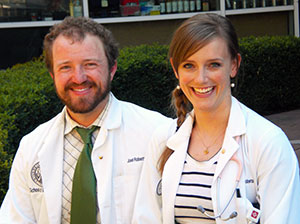Wedding Vows in Medical School
All 'Bout Couples Helps the Harried and Married.
By Tonia Twichell
 (
(
Before they married, they’d both planned careers in medicine, but they knew there was no guarantee they’d get into the same school at the same time.
“We talked to our pre-med advisor,” at Azusa Pacific University in California, Sammie Roberts says. “He told us that there isn’t a formal way to apply together and that we were kind of rare in his experience. He advised us that our best policy was to be open with admissions committees we interviewed with that we were in this together.”
They were relieved when CU School of Medicine accepted them, but they also were aware that medical school’s long study hours and clinical rotations have a reputation for taking a toll on relationships.
“There were a couple of naysayers who told us we might not be making the right choice,” Sammie says. “We definitely decided that we would prioritize our marriage.”
Shortly after starting their first year, Sammie and Joel discovered a student organization that supports medical students and their families
“We really try to emphasize that even if both people aren’t in medical school like we are, the whole family is actually in medical school because everyone is affected by it,” says Joel Roberts, co-president of ABC
“A lot of single class members are going out partying after tests,” he says. “The majority of students with families are using the opportunity to finally catch up with their kids and their spouse.”
In his graduation address this spring, Dean Richard Krugman, MD, told graduates that previous generations didn’t have to worry about balancing family and medicine. When his father was in his medical residency 75 years ago, interns received half a day off every two weeks and were not allowed to be married. During Krugman’s residency, students could be married but rarely saw their families because they worked 36-hour shifts with 12 hours off in between
“We take some older nontraditional medical students—many are having a second career,” Blevins says. “They’ve spent 10 or 15 years in their first career and they’re likely to have family and children.”
Each year, ABC hosts barbecues and other events so students and their families can get to know each other. The School of Medicine holds an annual Valentine’s Day dinner to support couples.
“We were shocked in a way that it was so family-friendly here,” Sammie says
“I guess I’d tell people that they have to expect to sacrifice something, and that’s OK,” Sammie says. “But I think it’s important to know your priorities going into medical school so you don’t end up sacrificing something that you hadn’t intended to.”
Developing a support network is important, too. The Roberts’ church and family were helpful when times were hard.
“We could ask people to bring us food when we didn’t have time to make anything. Our parents dropped by casseroles. That allowed us to have time to be together and not be as stressed. That outside support is really critical.”